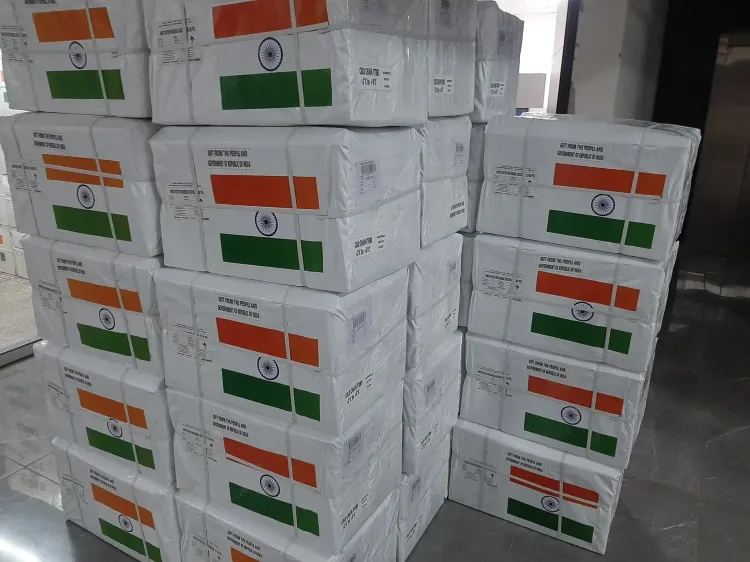India Provides $2 Million Medical Aid to Nepal for Thalassemia and Sickle Cell Patients

Synopsis
India has sent $2 million in medical aid to Nepal under its Neighbourhood First Policy, aimed at helping Thalassemia and Sickle Cell patients. This assistance includes essential medicines and vaccines as part of ongoing health cooperation between the two nations.
Key Takeaways
- $2 million medical assistance sent to Nepal.
- Focus on patients with Thalassemia and Sickle Cell Disease.
- Initial shipment includes 17,030 vaccine vials.
- Strengthening health cooperation between India and Nepal.
- Previous health projects include the BPKIHS and Nepal Bharat Maitri Trauma Centre.
New Delhi, April 25 (NationPress) In alignment with Prime Minister Narendra Modi’s Neighbourhood First Policy, India has dispatched medical aid valued at $2 million to Nepal to support patients afflicted with Thalassemia and Sickle Cell Disease.
“In reaffirmation of India's dedication to the Neighbourhood First Policy, we are providing assistance, which includes essential medicines and vaccines for Thalassemia and Sickle Cell Disease patients, responding to Nepal's request,” stated Randhir Jaiswal, the official spokesperson for the Ministry of External Affairs, on X.
“The initial shipment includes 17,030 vials of vaccines intended for the immunization of Thalassemia patients,” he further mentioned.
India and Nepal, as close neighbors, are involved in extensive multi-sectoral cooperation, particularly in health. A significant health initiative was the establishment of a 50-seat medical college and a 350-bed hospital at the B.P. Koirala Institute of Health Sciences (BPKIHS) in Dharan.
Other initiatives encompass the establishment of the Nepal Bharat Maitri Emergency & Trauma Centre (completed in 2008) and the creation of a 5-storey OPD cum Ward Block at Bir Hospital, Kathmandu, which accommodates 2,500 patients (completed in 1985).
The former stands as the first trauma center in Kathmandu equipped with specialized facilities akin to the All India Institute of Medical Sciences (AIIMS).
The ongoing health collaboration also consists of supplying medical equipment.
In 2023, India delivered 200 Kidney Dialysis Machines and 50 Reverse Osmosis (RO) systems to the Government of Nepal. Additionally, the Bhabhatron II Radiotherapy Machine and its simulator were handed over to Bhaktapur Cancer Hospital in 2024.
As per the MEA, Nepal was among the first nations to receive the ‘Made in India COVID-19’ vaccine on January 21, 2021, facilitating Nepal’s nationwide vaccination initiative. India also supplied 23 tonnes of critical medicines during the early stages of the pandemic.
Earlier this month, Nepal's Prime Minister K.P. Sharma Oli expressed that his discussions with Prime Minister Modi at the 6th BIMSTEC Summit in Bangkok were “extremely fruitful and positive.”
“I had a constructive meeting with Prime Minister K.P. Sharma Oli in Bangkok. India places great importance on relations with Nepal. We explored various aspects of India-Nepal friendship, especially in sectors like energy, connectivity, culture, and digital technology. We also reviewed key positive outcomes from this year's BIMSTEC Summit, particularly regarding disaster management and maritime transport,” PM Modi posted on X after their meeting.








